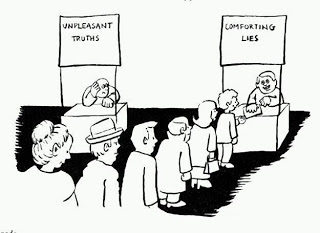Can cognitave dissonance be the source of everything that's wrong?
brainwash·@alexhottel·
0.000 HBDCan cognitave dissonance be the source of everything that's wrong?
For those who don't know, cognitive dissonance is when new information challenges our established thought or identity. Let's say you're Tiger Woods playing a round of golf with a sixteen year old on a rural high school's junior varsity team. The high school student is playing much better golf than Tiger. The drives are longer, the shots are more strait and consistent and the puts never miss the hole. The high school student creams Tiger at the round of golf. Tiger, being a professional golfer, has a few options on how to interpret his loss against the student. He can be like "Damn, maybe I'm not so good" or "Wow, this kid is going to surpass my legend in the world of golf." Those examples are an acceptance of reality. The other option is that Tiger would unknowingly employ cognitive dissonance, where he would say things more akin to "I let that kid win," I didn't drink enough water," "that kid had to have been cheating" and so on. Minimally, cognitive dissonance would cause Tiger (in this example) to assume he is still better at golf that the high school kid, even though he just lost the game to him, and therefore, not feel the need to get better at his game. You can see in that hypothetical example that cognitive dissonance can stunt the growth of a person. What can cognitive dissonance do on a mass scale? In the famous book "Think and Grow Rich," author Napoleon Hill writes how college graduates think that their learning days are behind them, they know all they need to know, but they are stuck in a life of relative poverty anyway because the drive of personal achievement through knowledge is gone. In turn, what we have are droves of know-it-alls who think any other information is wrong. Don't believe me? If you know a college graduate, tell them something that they would already know. Chances are they will refute what you told them simply because it's not coming from an "expert" in their field. When someone loses a debate or argument, they will never admit they're wrong. It's sad but facts don't matter, to anyone, not you or me. I mean some do but they're the ones we choose. Anyway, the loser of an argument will acknowledge their loss hurling insults and perhaps get violent. That is cognitive dissonance at play there. Cognitive dissonance affects everybody, you and me. In my opinion, conquering it (and some other things) is humanities' next big leap forward. 